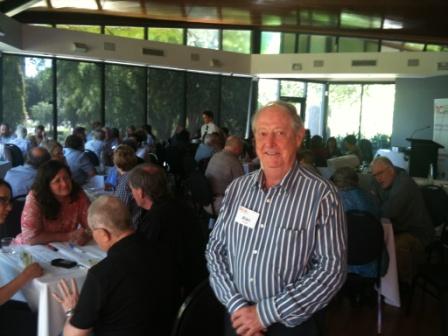
Community Conversation 22nd Nov 2012
On 22nd November 2012 over 60 people attended a public event in Adelaide to discuss the use of linked data in Cancer research and policy analysis. This public event was designed to allow people unfamiliar with Cancer Research and the linking of data to be given an opportunty to know more about data linkage and to provide feedback from a health consumer and community perspective. The morning session was conducted in a relaxing cafe style event, followed by a light lunch. It was co-sponsored by the Health Consumer Alliance of SA and SA NT DataLink, with the support of the members of Cancer Voices and the SA NT DataLink Consumer Reference Group members. The chair of the SA NT DataLink Consumer Reference Group, Stephanie Miller hosted the half day event.
Andrew Stanley, the Director of SA NT DataLink introduced the privacy protected practices and secure handling of personal data used by SA NT DataLink, through showing a short animated video.
Professor David Roder explained the fundamental benefit from linking data from various sources to obtain greater understanding and benefit to health consumers, patients and family members, as well as clinicians involved in the diagnosis and treatment of bowel and colon cancer in SA. David discussed the ability to bring together data from the cancer registry, hospital system, and radiology practices to analyse the stage of diagnosis, treatment plan, survival rates and outcomes for both metropolitan and rural patients. He explained that without the ability to link data from various sources, the ability to review the quality of practice was not possible. This use of linked data analysis should be considered a routine in evaluating the quality of care and practice being given to health consumers.
The members of the public, advocates from health consumer organisations and members of the SA NT DataLink Consumer Reference Group, were then invited to participate in a series of coversations in small groups of three to four people, facilitated by Alan Stewart. The community conversation used a 'World Cafe' style format, which enabled individuals the opportunty to share and talk about how this new technology to enable privacy protected health, medical and other records to be shared where the researchers would not have the ability to identify individuals.
